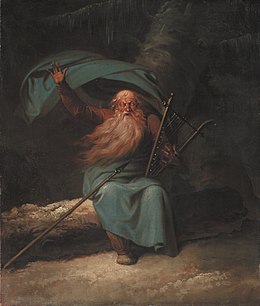
Back Осиан Bulgarian Ossian Catalan Ossian Welsh Ossian Danish Ossian (Person) German Οσσιανός Greek Ossian Estonian Ossian French Oisean Scots/Gaelic Ossian Galician

Ossian (/ˈɒʃən, ˈɒsiən/; Irish Gaelic/Scottish Gaelic: Oisean) is the narrator and purported author of a cycle of epic poems published by the Scottish poet James Macpherson, originally as Fingal (1761) and Temora (1763),[1] and later combined under the title The Poems of Ossian. Macpherson claimed to have collected word-of-mouth material in Scottish Gaelic, said to be from ancient sources, and that the work was his translation of that material. Ossian is based on Oisín, son of Fionn mac Cumhaill (anglicised to Finn McCool),[2] a legendary bard in Irish mythology. Contemporary critics were divided in their view of the work's authenticity, but the current consensus is that Macpherson largely composed the poems himself, drawing in part on traditional Gaelic poetry he had collected.[3]
The work was internationally popular, translated into all the literary languages of Europe and was highly influential both in the development of the Romantic movement and the Gaelic revival. Macpherson's fame was crowned by his burial among the literary giants in Westminster Abbey. W. P. Ker, in the Cambridge History of English Literature, observes that "all Macpherson's craft as a philological impostor would have been nothing without his literary skill."[4]
- ^ Kidd, Colin; Coleman, James (2012). "Mythical Scotland". In T. M. Devine, Jenny Wormald (ed.). The Oxford Handbook of Modern Scottish History. Oxford University Press. pp. 67–70. ISBN 978-0-19-956369-2.
- ^ Rainbolt, Dawn (8 March 2017). "Finn McCool & the Giant's Causeway". Wilderness Ireland. Retrieved 7 February 2020.
- ^ Cite error: The named reference
britannicawas invoked but never defined (see the help page). - ^ In The Cambridge History of English Literature, vol. 10 "The Age of Johnson": "The Literary Influence of the Middle Ages" p. 228.
© MMXXIII Rich X Search. We shall prevail. All rights reserved. Rich X Search